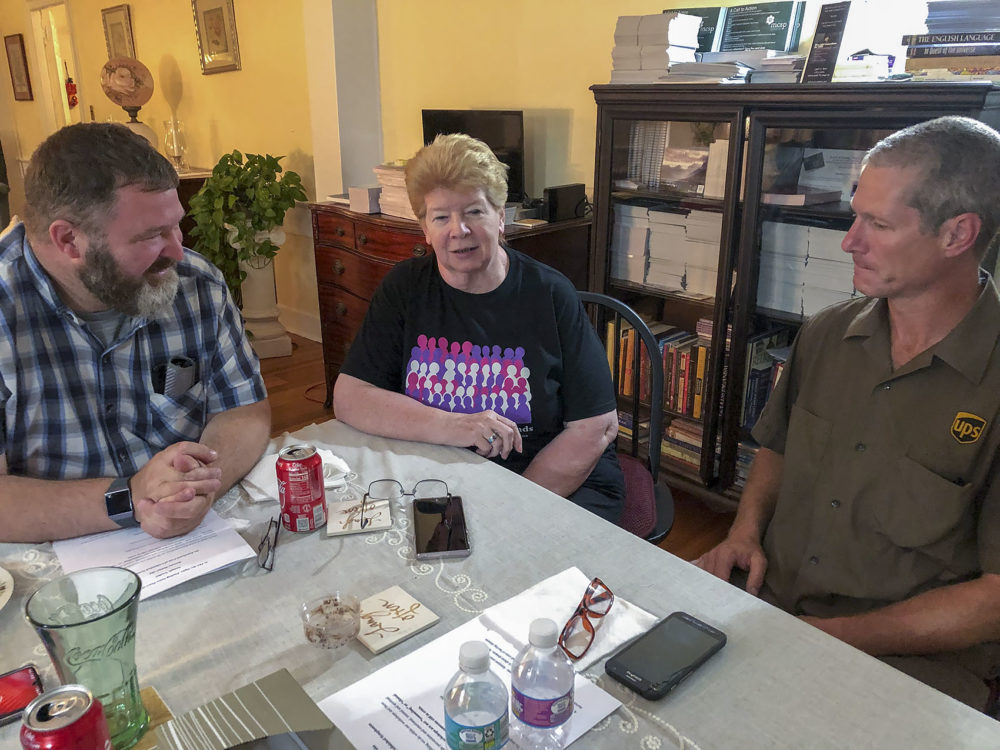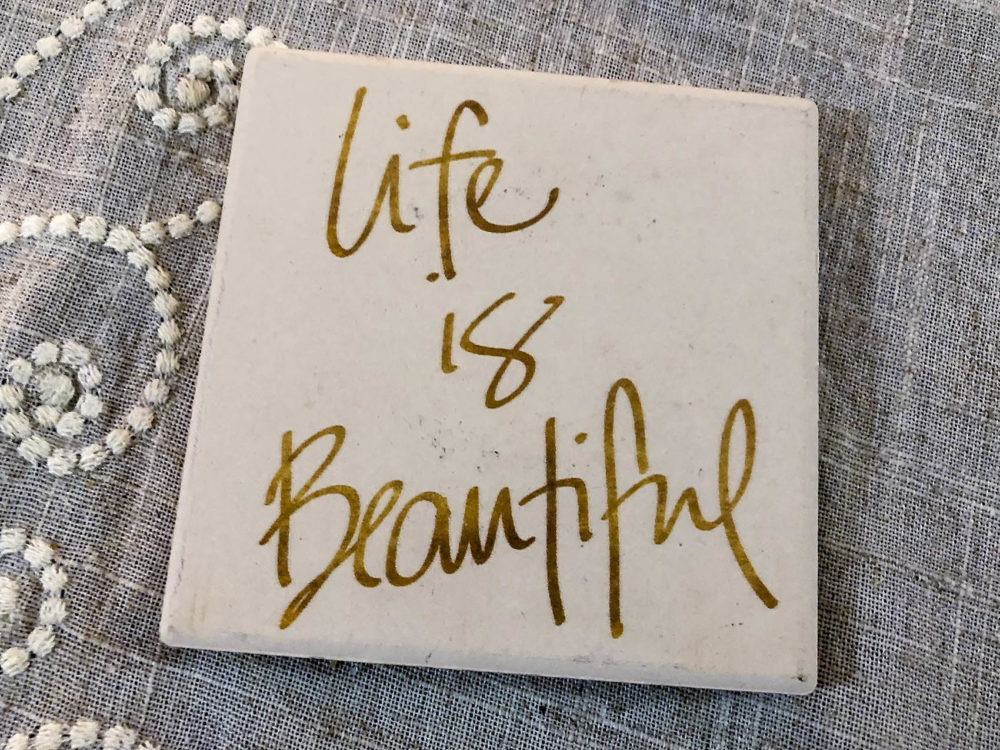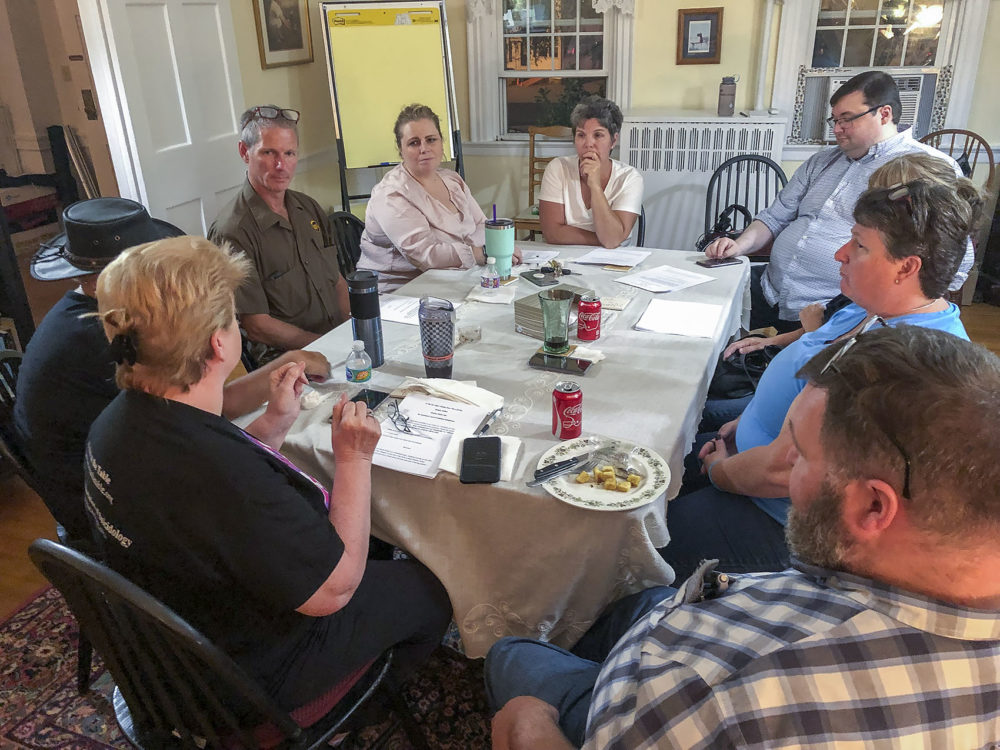Advertisement
Unusual Support Group Brings Together People Affected In Different Ways By Suicide
Resume
For Steven Palm, the blazing days of July are the toughest time of year.
The Taunton resident lost his 14-year-old daughter, Kacie, to suicide in July of 2014.
"We made it through July 17 again [this year]," he says. "A lot of people reached out to us, which is always good. We have a lot of support."
Early in his grief, Palm says, he talked with a therapist a couple of times. But it wasn't for him. Instead, he sought comfort among others who had lost a loved one to suicide — people who could understand. They could sit with him in his pain, as he wondered aloud why his vibrant, fun-loving daughter took her life.
"Even at 14 years old, every single day, [she said], 'Love you, Dad.' Every single day ... It's something I hold onto, and, you know, that's who she was," Palm says. "She loved to hug, and, you know, she loved to be around family and friends. And I just don't get it."
Palm is a 50-year-old UPS driver still in his brown uniform after a day of delivering packages. He found the support he was seeking around a dining table in the Taunton home of Annemarie Matulis. She's the director of the Bristol County Regional Coalition for Suicide Prevention.
"The hole in your heart never goes away. We know that, and we're not trying to fill it. But we do want to improve the quality of life," Matulis explains to the people at this night's meeting.
Matulis' home is a 270-year-old colonial furnished with antiques. Candle lamps on the wall give the living room a cozy glow. The table, where nine people sit on this summer night, is covered by an ivory embroidered table cloth. It's decorated with coasters that say "Laugh Often" and "Life is Beautiful."

Matulis started the support groups four years ago with the help of Tracey Medeiros, a woman she's long considered a daughter. Medeiros had attempted suicide multiple times more than a decade earlier.
At first, there were separate groups for people affected by suicide in different ways — attempt survivors in one room, loss survivors in another. But before long, the program evolved into something unusual — seemingly unheard of — in the suicide prevention community. The two groups started meeting together.
Now, sitting next to and across from Palm, the man who lost his daughter to suicide, are two women who've tried to take their own lives.
"I still suffer from suicidal thinking. It's just sort of a condition," says 53-year-old Carlene Murray. She attempted suicide twice. The first time was when she was 12 years old. The second was when she had two small children of her own.
Since joining the group, Murray says, she thinks of Palm and his suffering when her own thoughts turn dark.
"And it's sort of just kind of hanging over me," Murray explains. "His loss, but what I don't want my family to feel."
Murray says she couldn't think about her family when she was suicidal in the past. She was too overwhelmed. But hearing Palm's story of losing his daughter has changed things.
"It gets me outside myself, and maybe I'm just a little bit healthier for it," Murray says. "Through his tragedy, perhaps I'm saved. I don't know."
"That's good to hear," Palm responds, adding that he's never heard Murray say that before. "That's the hopes of me speaking out ... that I can help somebody else. I don't want anybody to have to go through what I've been through."
"The hole in your heart never goes away. We know that, and we're not trying to fill it. But we do want to improve the quality of life."
Annemarie Matulis
Later in the meeting, the power of what Murray said sinks in even more for Palm.
"I'm going to go to bed on that tonight," he says.
Matulis says when she first presented the idea of the combined support group to the wider suicide prevention community, during a workshop at an American Association of Suicidology conference in 2016, about half of the attendees opposed and criticized the idea.
"Professionals were concerned that if we put an attempt survivor with a loss survivor that the loss survivors were going to be hurt and offended; we were going to trigger them," Matulis recalls. "And it turned out just the opposite."
"The real enemy here is fear," says Tony Wood of Waltham. He's chairman of the board of directors of the American Association of Suicidology, and he's come to the support group meeting at Matulis' invitation.
The association is made up of suicide researchers, clinicians and prevention advocates. Wood says the suicide prevention community had previously resisted even inviting people who had attempted to kill themselves to join its efforts, never mind sitting those attempt survivors down with those who'd lost someone to suicide.
"We're afraid to talk about this because what if it causes Jim or Jenny to die, you know? Then how would we deal with that?" Wood says. "Well, staying silent never helped anybody with any other health conditions. So just swap it out. And it's like, well, you know, you don't get better from a respiratory infection by keeping quiet about it."
The combined support group is so unusual, some suicide prevention organizations around the country have asked Matulis and Medeiros to train them in the approach.
The Bristol County group also invites what it calls "impacted family members" to the table. Those are people who have loved ones with suicidal thoughts and behaviors.
Ted Figlock says his former wife attempted suicide before they married and after they divorced. But the risk of suicide didn't end there for his family. He says his four children, who are teenagers now, have each at some point expressed suicidal thoughts.
It's all consuming when a family member is in crisis, Figlock says. The support group has helped him realize he needs to watch out for himself, as well.
"Some of this gives you a chance to say, 'OK, am I stuck? Am I just in anger?'" Figlock says. " 'Have I been able to forgive myself for not being the solution?' And then realizing, well, you know, you can't be the solution. There's not one thing that contributes to suicidal thoughts or action, and there's not one thing that would solve it."

Being stuck — in fear or anger or depression — makes people avoid or abandon life goals, Matulis tells the group.
"So many of us have left something undone," she says. "We call them the unfinished symphonies."
At each meeting, she leads an activity meant to help people talk, connect and heal.
This night, she asks everyone to talk about dreams they've set aside and how they're going to get back to making those dreams a reality. People talk about goals from learning to play the piano, to skydiving, to traveling.
Palm has dreams of retiring with his wife to a peaceful place.
"You ever see those shows, and they show these places you where you can live for $800 a month and live right on the beach? We could do that," he says.
"My big-time goal is to graduate with a bachelor's in psychology," Medeiros shares.
Like Murray, Medeiros says she gave no thought to her family when she tried to take her own life.
For Palm, the man whose grief has been a lifeline to Murray, hearing Medeiros explain that has sustained him. It's helped him understand what his daughter might have been thinking.
"I know she loved me," he says. "She knows she was loved. She was not thinking — I know she wasn't thinking about what it would do to me, her mom, her brother, her friends."
Palm knows he'll likely never get answers to explain his daughter's suicide. But coming to this table has reinforced one thing that's often difficult for suicide loss survivors to embrace: it wasn't his fault.
Resources: You can reach the National Suicide Prevention Lifeline at 1-800-273-TALK (8255) and the Samaritans Statewide Hotline at 1-877-870-HOPE (4673).
This segment aired on September 10, 2019.
